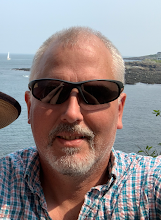I've been puzzling over ways to help push vital changes necessary to fix global warming.
My work as a policy analyst is rewarding. But, I'm left wishing it would result in more significant change and do so more quickly. Mostly, this is because deep down I know the aggressive change needed will require more than implementing state energy policies or running programs assisting business. I also know better than to think the goal is to change the minds of people connected to the big problems and turn them into big solutions. It may just be a matter of helping those who want to change (sound familiar blog reader?).
I feel driven to help grow an internet approach that might contribute to the waypoints needed for every decision-maker seeking to do their part. For me, it's a matter of optimizing the leverage provided by this free media. Even if it starts with one entry in a little blog, it's about thinking through some new ideas.
So, I've started by experimenting with the blog approach. A colleague who heard of my recent fixation told me the big influencers will be the ones bringing the 2 dimensional blog approach into the Web 2.0 world. But, what does that mean? A little browsing helped me explore a few innovative examples. Some are similarly pushing the eco effort, like green search engines and Twitter and FaceBook and YouTube. Others are pushing the envelope in other special interest spaces, like music map and wikipedia. It can be exhausting to maintain focus on the prize when stumbling across such gems for the first time.
But, I've tripped over a concept that, on some level is proven by the way I found it. Here's how my machete worked through the bramble in the jungle before stubbing my toe on the treasure chest:
1) Visit ViroPOP to check in on blog.
2) See post on green search engines. Interesting. I'll need to remember to come back to that.
3) Write a comment about Blackle (the energy efficient black google).
4) Google the term "black google" b/c I can't remember the name "blackle."
5) Discover there are numerous versions and one blog post from Google saying no energy is saved.
6) Revise the post announcing the discovery.
7) Curiosity gets the best of me and I seek more.
8) The Google post has related posts, one entitled "27 Great Green and Eco-Friendly Search Engines" on Web Ecoist.
9) A review of the comments yields even more, one of them quite interesting: Squidoo!
10) I visit the site, but, cautiously. I know my tendency to get distracted and go off point.
11) Rather than check the entire site (testing the search engine), I'm drawn to something that appears unrelated to the search engine, but more germane to my main interest, "Everyone Is an Expert (on Something)." Hmmm. Looks like a how to on blogging.
12) I click and it's an eBook by the Squidoo founder, Seth Godin. Before I know it, I've skimmed along (he's a captivating writer) to his main thesis: "The Lens is the next evolution of the blog." This is exactly the Web 2.0 idea I've been looking for!
The thought process for parsing through this complex problem has led me to a revelation: (1) Human nature directs the way we seek knowledge, using an active form of discovery. (2) A strategy designed to enable and exploit that style will optimize effectiveness. Put another way, most people today have been wielding hammers and looking for nails. While, all around us the screws and bolts have come loose. It's time to introduce a new set of tools without making the carpenter feel like an idiot.
Now think further back, when we first started using tools. Picture our early hominid ancestor at rest. What coaxes him (or her) along? Hunger. How does he begin? He sets out, foraging to meet the hunger quickly and efficiently. When he gathers his resource, if there's excess, he stockpiles it. If he does so too slowly his own repetition teaches him short cuts.
Following the steps #1-12, above, I was hungry, I foraged, I found an ant hill with a hole too small for my finger (and the ants bite me!), having given up, I stumble across a stick the size of the hole, I put it into the ant hill, pulling the stick out, I find that the ants have attacked it and are covering the stick. New Solution: Clumsy Reiteration = Accidental Discovery = Stick = Tool = Food.
What next steps does this suggest, you ask? Let's not tell everyone to eat ants. Let's litter the trail with right-sized sticks, knowing that the need for calories will eventually lead to an ant-filled diet.
And people wonder how an Ancient Civilizations major ended up a career environmentalist (and Last Week's BuyGreen Blog Winner! -- Thanks to Hannah at ViroPOP!).
Future Convention Planners, Be Warned
13 years ago

No comments:
Post a Comment